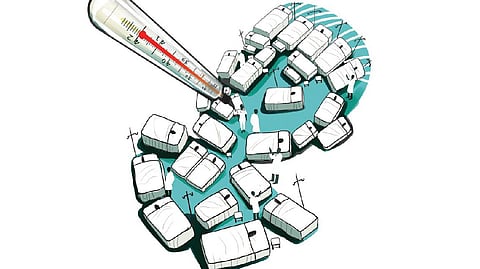

NEW DELHI: Delhi NCR is witnessing a sharp rise in cases of influenza, including swine flu, with many residents experiencing prolonged illness and severe symptoms.
A recent survey by LocalCircles, with over 13,000 responses from Delhi, Gurugram, Noida, Faridabad, and Ghaziabad, found that 54% of households in Delhi NCR have one or more individuals showing swine flu symptoms, such as fever, sore throat, cough, headache, stomach issues, joint pain, and respiratory problems.
The illness has been affecting people of all ages, though those above 50 years, young children, and individuals with pre-existing conditions such as hypertension, diabetes, asthma, COPD, and cardiac issues are particularly vulnerable. According to the survey, "hospitals are reporting more admissions of people with pneumonia and bronchitis due to severe infections."
"Earlier, the illness used to last five to seven days, but now it is lasting about 10 days. Another important difference is that people are experiencing shortness of breath, chest congestion, and wheezing. Earlier, flu-like episodes would consist mainly of cold, cough, and fever. People are experiencing what is called post-flu bronchial hyperactivity, where they are dealing with a prolonged cough. This cough can be very disturbing; it prevents them from sleeping at night, and they are unable to participate in their usual professional activities due to this persistent cough. This is a notable difference as compared to previous seasonal patterns. This kind of wheezing or prolonged cough usually requires nebulizers, bronchodilators, or inhalers, unlike in previous years when people mainly managed with rest and symptomatic treatment," said Dr Neetu Jain, Senior Consultant, Pulmonology, PSRI Hospital.
In addition to common flu-like symptoms, some patients have also reported gastrointestinal issues such as diarrhea and nausea, indicating the presence of new viral strains or complications.
Compared to August 2024, when a similar survey found that 38% of households were experiencing flu or viral fever cases, the latest findings highlight a worrying increase. "Viral illnesses rise in Delhi NCR from 38% of households experiencing it in August 2024 to 54% experiencing it in March 2025," the survey states.
The recovery period has also extended, with many people taking up to 10 days to recover instead of the usual 5-7 days, raising concerns about the severity of the infections.
The survey further revealed that out of 13,938 respondents, "9% stated that 4 or more individuals in their household have Covid/flu/viral fever symptoms; 45% of respondents said 2-3 individuals, while 36% of respondents thankfully reported no cases in their household." The remaining 10% of respondents did not provide a clear answer.
As infections continue to rise, health experts are calling for further investigation into whether environmental factors, new viral mutations, or inadequate preventive measures are contributing to the current surge in infections.